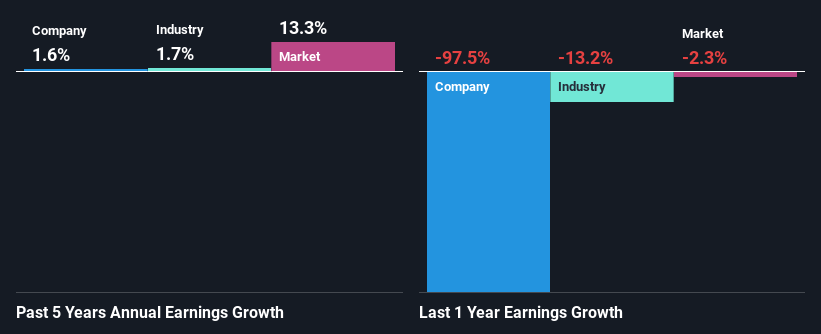Merck & Co., Inc.'s (NYSE:MRK) Stock Financial Prospects Look Bleak: Should Shareholders Be Prepared For A Share Price Correction?
Merck's (NYSE:MRK) stock is up by 7.0% over the past three months. However, its weak financial performance indicators makes us a bit doubtful if that trend could continue. In this article, we decided to focus on Merck's ROE.
ROE or return on equity is a useful tool to assess how effectively a company can generate returns on the investment it received from its shareholders. In simpler terms, it measures the profitability of a company in relation to shareholder's equity.
Check out our latest analysis for Merck
How Is ROE Calculated?
ROE can be calculated by using the formula:
Return on Equity = Net Profit (from continuing operations) ÷ Shareholders' Equity
So, based on the above formula, the ROE for Merck is:
1.0% = US$377m ÷ US$38b (Based on the trailing twelve months to December 2023).
The 'return' is the yearly profit. That means that for every $1 worth of shareholders' equity, the company generated $0.01 in profit.
What Has ROE Got To Do With Earnings Growth?
So far, we've learned that ROE is a measure of a company's profitability. Based on how much of its profits the company chooses to reinvest or "retain", we are then able to evaluate a company's future ability to generate profits. Assuming everything else remains unchanged, the higher the ROE and profit retention, the higher the growth rate of a company compared to companies that don't necessarily bear these characteristics.
Merck's Earnings Growth And 1.0% ROE
As you can see, Merck's ROE looks pretty weak. Even when compared to the industry average of 19%, the ROE figure is pretty disappointing. Therefore, Merck's flat earnings over the past five years can possibly be explained by the low ROE amongst other factors.
Next, on comparing Merck's net income growth with the industry, we found that the company's reported growth is similar to the industry average growth rate of 1.7% over the last few years.
The basis for attaching value to a company is, to a great extent, tied to its earnings growth. The investor should try to establish if the expected growth or decline in earnings, whichever the case may be, is priced in. Doing so will help them establish if the stock's future looks promising or ominous. One good indicator of expected earnings growth is the P/E ratio which determines the price the market is willing to pay for a stock based on its earnings prospects. So, you may want to check if Merck is trading on a high P/E or a low P/E, relative to its industry.
Is Merck Efficiently Re-investing Its Profits?
Merck has a very high three-year median payout ratio of 110% over the last last three years, which suggests that the company is dipping into more than just its earnings to pay its dividend. This does go some way in explaining the negligible earnings growth seen by Merck. Paying a dividend beyond their means is usually not viable over the long term. That's a huge risk in our books. To know the 5 risks we have identified for Merck visit our risks dashboard for free.
In addition, Merck has been paying dividends over a period of at least ten years suggesting that keeping up dividend payments is way more important to the management even if it comes at the cost of business growth. Existing analyst estimates suggest that the company's future payout ratio is expected to drop to 31% over the next three years. As a result, the expected drop in Merck's payout ratio explains the anticipated rise in the company's future ROE to 39%, over the same period.
Conclusion
In total, we would have a hard think before deciding on any investment action concerning Merck. Although the company has shown a fair bit of growth in earnings, yet the low ROE and the low rate of reinvestment makes us skeptical about the continuity of that growth, especially when or if the business comes to face any threats. With that said, the latest industry analyst forecasts reveal that the company's earnings are expected to accelerate. Are these analysts expectations based on the broad expectations for the industry, or on the company's fundamentals? Click here to be taken to our analyst's forecasts page for the company.
Have feedback on this article? Concerned about the content? Get in touch with us directly. Alternatively, email editorial-team (at) simplywallst.com.
This article by Simply Wall St is general in nature. We provide commentary based on historical data and analyst forecasts only using an unbiased methodology and our articles are not intended to be financial advice. It does not constitute a recommendation to buy or sell any stock, and does not take account of your objectives, or your financial situation. We aim to bring you long-term focused analysis driven by fundamental data. Note that our analysis may not factor in the latest price-sensitive company announcements or qualitative material. Simply Wall St has no position in any stocks mentioned.

 Yahoo Finance
Yahoo Finance 
